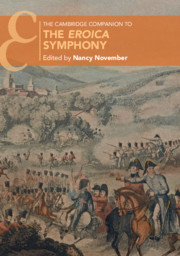Book contents
- The Cambridge Companion to the Eroica Symphony
- Cambridge Companions to Music
- The Cambridge Companion to the Eroica Symphony
- Copyright page
- Contents
- Illustrations
- Musical Examples
- Notes on Contributors
- Eroica Chronology, 1770–2020
- Acknowledgements
- Introduction
- Part I Context and Genesis
- Part II Analytical Approaches
- Part III Reception
- 9 Who is the Hero? The Early Reception of the Eroica
- 10 The Eroica in the Nineteenth and Twentieth Centuries
- 11 Performing, Arranging and Rearranging the Eroica: Then and Now
- 12 The Eroica Endures: Beethoven’s Third Symphony in the Twenty-First Century
- Further Reading
- General Index
9 - Who is the Hero? The Early Reception of the Eroica
from Part III - Reception
Published online by Cambridge University Press: 04 June 2020
- The Cambridge Companion to the Eroica Symphony
- Cambridge Companions to Music
- The Cambridge Companion to the Eroica Symphony
- Copyright page
- Contents
- Illustrations
- Musical Examples
- Notes on Contributors
- Eroica Chronology, 1770–2020
- Acknowledgements
- Introduction
- Part I Context and Genesis
- Part II Analytical Approaches
- Part III Reception
- 9 Who is the Hero? The Early Reception of the Eroica
- 10 The Eroica in the Nineteenth and Twentieth Centuries
- 11 Performing, Arranging and Rearranging the Eroica: Then and Now
- 12 The Eroica Endures: Beethoven’s Third Symphony in the Twenty-First Century
- Further Reading
- General Index
Summary
The early reception of Beethoven’s Eroica proves to be a complex phenomenon. The new audiences that emerged around 1800 were interested in understanding music both through listening and through reading about it in new journals devoted to music. Beethoven’s music was considered very difficult, but worth the challenge. The dominant image of Beethoven and the status of the symphony both played an important role in the Eroica’s early reception. From the nineteenth century onwards there has been a strong desire to understand Beethoven’s music by relating it to biography. In the case of the Eroica Symphony there has been a focus on the title, and on the unnamed great man or hero, as well as on the interpretation of the Marcia funebre. Authors such as Hector Berlioz, Ferdinand Ries, Anton Schindler and Carl Maria von Weber contributed to interpretations that ranged from relating the symphony to the ancient world to the attempt to establish a programme related to Napoleon, Prince Louis Ferdinand of Prussia, Admiral Horatio Nelson or General Ralph Abercromby. So the Eroica has been understood variously as a political statement. Others commentators, such as Richard Wagner, saw Beethoven himself is the hero of this symphony.
Keywords
- Type
- Chapter
- Information
- The Cambridge Companion to the Eroica Symphony , pp. 183 - 197Publisher: Cambridge University PressPrint publication year: 2020



